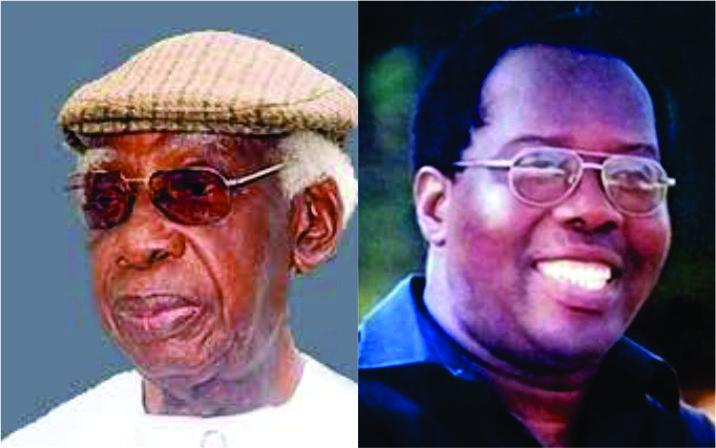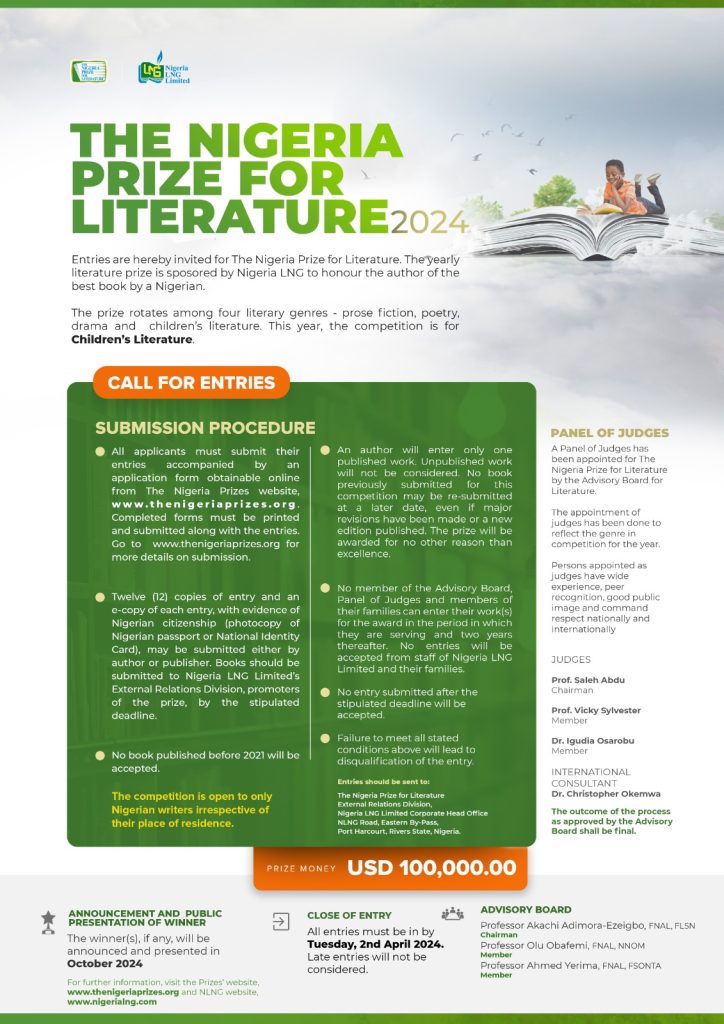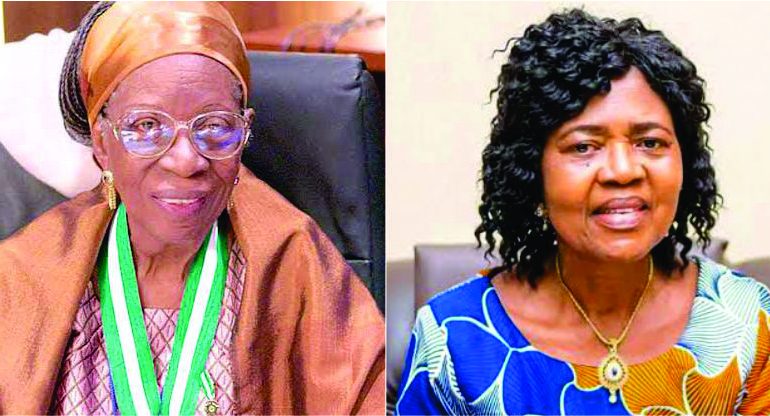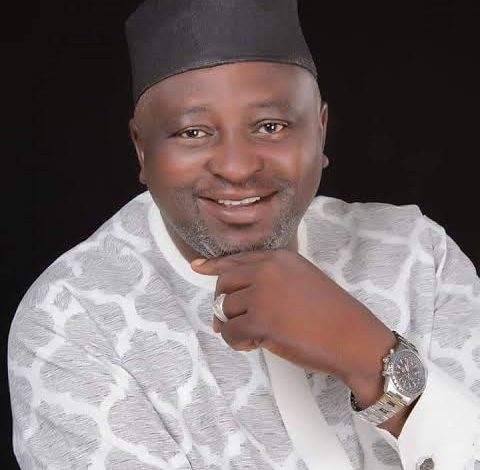Remembering fallen laureates of The Nigeria Prize for Literature

* Your craft as passport to immortality
By Anote Ajeluorou

COUNTDOWN TO APRIL 2 SUBMISSION DEADLINE: 6 DAYS TO GO!
LIFE is transience, and sooner or later man responds to what Gabriel Okara aptly describes as ‘the seabird call’ in his famous poem ‘The Call of the River Nun,’ and then he vacates the stage. It is therefore what man or woman leaves behind that becomes the reference point and highlight of his or her existence on this plain. It’s this process of transiting to ancestry that the question of legacy building arises: what did he or she leave behind for posterity? Where can we find his or her footprints in the sands of time?
Fortunately for men and women of letters, legacy is somewhat a given, especially if your craft stands out; that becomes the highpoint of your existence as a creative writer. Not children or material things especially that do not last more than a generation after the owner passes on. Of course, men or women of letters score poorly on material things; it’s not their calling. That is why their craft becomes their passport unto immortality, and it’s why writers must pay close attention to their craft and give it the best shot.
As The Nigeria Prize for Literature, sponsored by Nigeria Liquified Natural Gas (LNG) Limited clocks 20 years since its inception, these fallen laureates are being remembered for the gift of their craft to humanity. From Ezenwa-Ohaeto, Gabriel Okara, Esiaba Irobi to Sam Ukala and Ikeogu Oke, these laureates have been worthy ambassadors of the Nigerian creative spirit. They have written their names in golden letters and in our hearts, forever. These fallen laureates (no woman has as yet fallen) of The Nigeria Prize for Literature deserve to be celebrated for the gift of their craft to us who survived them.
The first to say goodbye are the first winners of the prize. They are Prof. Ezenwa Ohaeto and Gabriel Okara, who jointly won with their works – Chants of a Minstrel and The Dream, His Vision respectively in 2005.
Born on April 24, 1921 and died on March 25, 2019, Gabriel Imomotimi Okara was a Nigerian poet and novelist who hailed from Bumoundi in Yenagoa, Bayelsa State. The first modernist poet of Anglophone Africa, he is best known for his early experimental novel, The Voice (1964), and his award-winning poetry, published in The Fisherman’s Invocation (1978) and The Dreamer, His Vision (2005). In both his poems and his prose, Okara drew on African thought, religion, folklore and imagery. According to Brenda Marie Osbey, editor of his Collected Poems, “It is with publication of Gabriel Okara’s first poem that Nigerian literature in English and modern African poetry in this language can be said truly to have begun.”
A well garlanded poet and writer, in 1953 he had the Best All-Round entry in Poetry at the Nigerian Festival of Arts, for ‘The Call of the River Nun’, and in 1979 he clinched the Commonwealth Poetry Prize, for The Fisherman’s Invocation. In 2009 he received the Pan African Writers’ Association’s Honorary Membership Award, and in 2017 the Gabriel Okara Literary Festival was instituted at the University of Port Harcourt. Sadly, the festival had only on edition before it became defunct on account of lack of funding from the university, corporate bodies and philanthropic individuals. The lack of continuity of Gabriel Okara Festival has a major blow to the literary and academic communities and the enduring legacies of a pioneer writer like Okara.

Gabriel Okara and Ezenwa Ohaeto
At the first and only edition of the festival, academics from far and near took the festival opportunity to showcase their scholarly fervour in the volume of papers they presented. It is not clear if those papers have been harvested in a volume and made available to the public. The Gabriel Okara Festival is as much a challenge of legacy building as a call for continuity in cultural production platforms that give opportunity to the flowering of talents of both young and old.
A Nigerian poet, short story writer and academic, Ezenwa-Ohaeto was one of the first Nigerians to publish poems written in pidgin English. He was born on March 31, 1958 to Michael Ogbonnaya Ohaeto in Ife Ezinihite in Mbaise Local Government Area of Imo State. Ezenwa-Ohaeto studied at the University of Nigeria under the tutelage of the novelist Chinua Achebe and the critic Donatus Nwoga from 1971 to 1979. He earned Masters of Arts from University of Nigeria, Nsukka, and was awarded a PhD in literature from University of Benin, Benin City. Ezenwa-Ohaeto at Ahmadu Bello University, Zaria, Anambra State College of Education, Awka, Alvan Ikoku Federal College of Education and Nnamdi Azikiwe University from 1998 until his death in 2005.
Ezenwa-Ohaeto was awarded BBC Arts and Africa Poetry Award, Association of Nigerian Authors/Cadbury Poetry Award and Fellow of African Studies Centre, University of Cambridge, where he died in 2005. His other works include I Wan Bi President, Songs of a Traveller, Chinua Achebe: A Biography, The Voice of the Night Masquerade, ‘If to Say I bi Soja’ and ‘Winging Words’.
In 2010 in the drama category, Dr. Esiaba Irobi won The Nigeria Prize for Literature with his seminal play Cemetery Road, beating two other theatre greats – Ahmed Yerima and Adinoyi Ojo Onukaba who were also shortlisted. Poet, playwright, actor and academic, Irobi was born on January 10, 1960, and obtained a Bachelor of Arts in English/Drama and a Master of Arts in Comparative Literature from the University of Nigeria, Nsukka, a Master of Arts in Film and Theatre from the University of Sheffield, Sheffield, UK and a PhD in Theatre Studies from the University of Leeds, UK. He taught at Liverpool John Moores University in England and the Tisch School of the Arts, New York University, and was associate professor of International Theatre and Film Studies at Ohio University, Athens, US.
Irobi’s other works include The Colour of Rusting Gold (1989), Gold, Frankincense, and Myrrh (l989), Hangmen Also Die (1989), Nwokedi (1991), The Other Side of the Mask (1999), and The Fronded Circle (1999). Cotyledons (l987), Inflorescence (1989) and Why I Don’t Like Philip Larkin (2005) are some of his poetry collections in his rich and varied creative life. Sadly, the world lost him to cancer in Berlin, Germany on May 3, 2010, five months before he was declared winner of the prize posthumously.
Winner in the next drama circle of The Nigeria Prize for Literature in 2014 was Prof. Sam Ukala. He won with Iredi War, and would also became an ancestor in 2021. Ukala was a professor of Theatre Arts and Drama at Delta State University, Abraka, Nigeria, a 1993/94 Commonwealth academic staff fellow, who also researched and taught at the School of English Workshop Theatre of the University of Leeds in the UK. As an academic, he propounded the theory of ‘folkism’, the tendency to base literary plays on indigenous history and culture and to compose and perform them in accordance with the aesthetics of African folktale composition and performance. He was Chairman of Delta State Chapter of Association of Nigerian Authors (ANA) 2021. In 2000 he was named Association of Nigerian Authors (ANA) Pillar of Arts Award for Prose for Skeletons: A Collection of Short Stories and in 1989 he won ANA/British Council Prize for Drama for Akpakaland.
The last of the fallen laureates is Ikeogu Oke, winner of The Nigeria Prize for Literature in 2017 for his poetry collection, The Heresiad. Like Irobi, Oke also succumbed to cancer. He beat Dr. Ogaga Ifowodo and Prof. Tanure Ojaide to win the coveted prize. Oke was a colourful performer of his poetry and regaled the audience with his Ohafia war regalia while performing at the Book Party that preceded the prize award. Oke obtained a BA degree in English and Literary Studies from the University of Calabar and an MA in Literature from the University of Nigeria, Nsukka. His other works include Where I was Born (2002), Salute Without Guns (2009) and In the Wings of Waiting (2012). Oke also published two children’s books, The Lion and the Monkey (2014) and The Tortoise and the Princess (2015). He was born on May 23, 1967 and died on November 24, 2018.
In his acceptance speech at the prize award, Oke described poetry as “healthy narcotics,” adding, “I am happy to be addicted to it as shown by my refusal to be swayed by such concerns. I have invoked the poem here hopefully to arouse the contemplation of how one’s resolve to pursue one’s dreams in spite of such concerns is the best decision that can lead to a fulfilled life,” he wrote in his acceptance speech. The Heresiad has been described as “a work that speaks to an intense commitment to innovation, tenacity, joyful experimentation and social commentary in a way that provokes delight and engagement” with the prize judges describing it as “a bold and wonderful experiment whose great strength also could have been its great weakness.”



